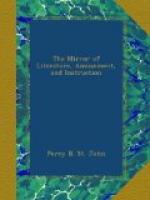improved by Dolland, Troughton, and others. Near
it is a curious transit-clock, made by Graham, but
greatly improved by Earnshaw, who so simplified the
train as to exclude two or three wheels, and also added
cross-braces to the gridiron-pendulum, by which an
error of a second per day, arising from its sudden
starts, was corrected. The quadrant-room has a
stone pier in the middle, running north and south,
having on its east face a mural-quadrant, of eight
feet radius, made by Bird, in 1749, by which observations
are made on the southern quarter of the meridian, through
an opening in the roof three feet wide, produced by
means of two sliding shutters; on its west face is
another eight-feet mural quadrant, with an iron frame,
and an arch of brass, made by Graham, in 1725:
this is applied to the north quarter of the meridian.
In the same apartment is the famous zenith-sector,
twelve feet in length, with which Dr. Bradley, at
Wanstead, and at Kew, made those observations which
led to the discovery of the aberration and nutation:
here also is Dr. Hooke’s reflecting telescope,
and three telescopes by Harrison. On the south
side of this room is a small building, for observing
the eclipses of Jupiter’s satellites, occultations,
&c., with sliding shutters at the roof and sides,
to view any portion of the hemisphere, from the prime
verticle down to the southern horizon: this contains
a forty-inch achromatic, by the inventor, Mr. John
Dolland, with a triple object-glass, a most perfect
instrument of its kind; and a five-feet achromatic,
by John and Peter Dolland, his sons. Here, likewise,
are a two-feet reflecting-telescope (the metals of
which were ground by the Rev. Mr. Edwards), and a
six-feet reflector, by Dr. Herschell.
The lower part of the house serves merely for a habitation;
but above is a large octagonal room, which, being
now seldom wanted for astronomical purposes, is used
as a repository for such instruments as are too large
to be generally employed in the apartments first described,
or for old instruments, which modern improvements
have superseded. Among the former is a most excellent
ten-feet achromatic, by the present Mr. Dolland, and
a six-feet reflector, by Short, with a clock to be
used with them. In the latter class, besides
many curious and original articles, which are deposited
in boxes and cupboards, is the first transit instrument
that was, probably, ever made, having the telescope
near one end of the axis; and two long telescopes
with square wooden tubes, of very ancient date.
Here, likewise, is the library, which is stored with
scarce and curious old astronomical works, including
Dr. Halley’s original observations, and Captain
Cook’s Journals. Good busts of Flamstead
and Newton, on pedestals, ornament this apartment;
and in one corner is a dark narrow staircase, leading
to the leads above, whence the prospect is uncommonly
grand; and to render the pleasure more complete, there
is, in the western turret, a camera obscura,
of unrivalled excellence, by which all the surrounding
objects, both movable and immovable, are beautifully
represented in their own natural colours, on a concave
table of plaster of Paris, about three feet in diameter.




